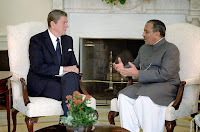 |
Reagan with Zia (1982) |
Since its creation seventy-five years ago, Pakistan has experienced four major military dictatorships: General Ayub Khan (1958–1969), General Yahya Khan (1969–1971), General Zia-ul-Haq (1977–1988), and General Pervez Musharraf (1999–2008).
A common thread running through these regimes is the implicit—or at times explicit—support they received from the United States. Washington, often seen as a global promoter of democracy, played a far more pragmatic and self-interested role in the politics of Pakistan.
During the Cold War, Pakistan emerged as a key player in America's strategic calculus. In the 1950s, it joined the U.S.-led military alliances CENTO and SEATO, which were modeled on NATO and aimed at containing Soviet influence. These alliances effectively placed Pakistan under the U.S. security umbrella and entrenched its role as a client state within the American geopolitical order.
The relationship deepened further in the 1980s during General Zia-ul-Haq’s regime. Under his leadership, Pakistan became the launchpad for the U.S.-backed jihad against Soviet forces in Afghanistan. Billions of dollars flowed into the region, fueling the rise of Islamic militancy with long-term consequences for regional security. Ironically, two decades later, the U.S. relied on another Pakistani dictator, General Musharraf, to dismantle the very militant networks it had helped to nurture—an effort that brought further instability and violence to the region.
The costs of these Cold War calculations and post-9/11 realignments were borne not just by Pakistan or Afghanistan, but also by India—particularly in Kashmir, which witnessed a rise in cross-border militancy. India, though not a direct participant in these U.S.-Pakistan maneuvers, found itself repeatedly affected by the fallout of a strategy it had no role in shaping.
To believe that America’s foreign policy is consistently guided by a commitment to democracy and free markets is to ignore the historical record. The reality is more utilitarian: the U.S. has often backed authoritarian regimes when doing so served its strategic interests. In the case of Pakistan, successive military rulers found favor in Washington not because they upheld democratic ideals, but because they were seen as reliable instruments of American power projection in a volatile region.
This pattern reveals a deeper truth: when the imperatives of global supremacy clash with democratic principles, pragmatism often wins. Washington’s support for military dictators and religious hardliners in Pakistan was not an aberration, but a calculated choice rooted in geopolitical expediency.
No comments:
Post a Comment